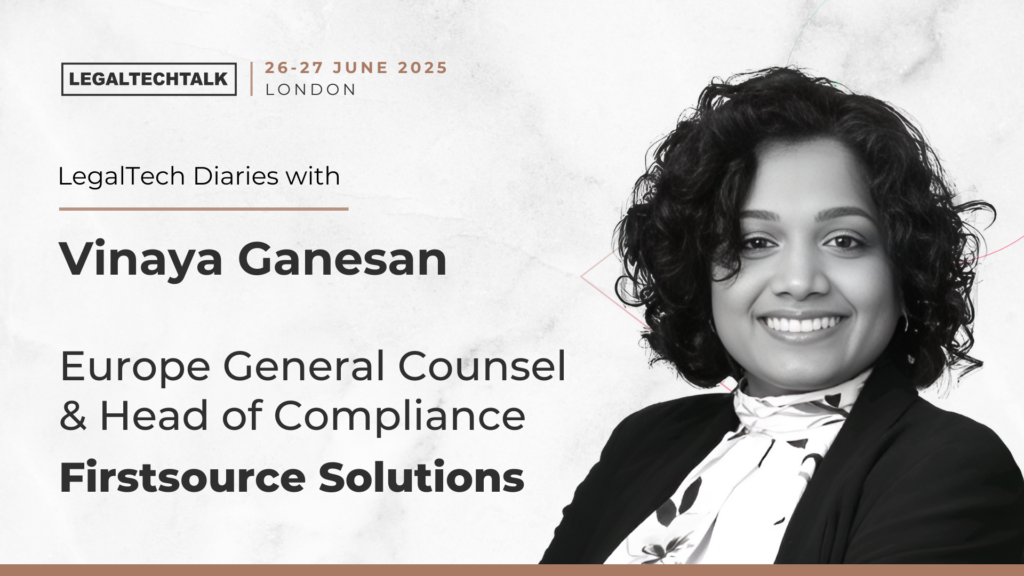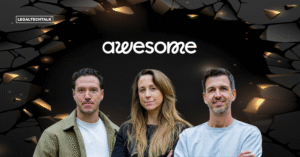In this insightful interview, Vinaya Ganesan, Europe General Counsel and Head of Compliance at Firstsource, discusses the challenges legal teams face in adopting and implementing new technologies. She emphasises the mindset shift required, as lawyers must become comfortable with failure and embrace change.
Vinaya also highlights the importance of developing new skillsets, such as understanding change management principles. She shares key success factors for company-wide legaltech adoption, including clearly defining the problem statement, assembling a dedicated team, fostering collaboration across the organisation, and celebrating small wins. Additionally, Vinaya offers her perspective on the impact of micro-solutions and plug & play technologies on the legal industry in the next 24 months.
Merlin Beyts: What challenges do legal teams face when trying to adopt and implement new technologies?
Vinaya Ganesan: The main challenges with lawyers vis-à-vis ‘legal tech’ are mindset and skill set.
Mindset– Lawyers are trained to avoid risks, aim for a high success rate (if not 100%), and bear their client’s needs acutely in mind. Technology, by nature, is prone to fail, requires a long-term strategy, and comes with a level of disruption. GCs tend to worry that any failure of legal tech might cause reputational damage for the team, affecting the operations of the business. By interacting with other arms of the business, lawyers will appreciate that new tech comes in all sizes and is being experimented with all the time. We need to become comfortable with failure, be genuinely excited by the prospects of change, and become avid advocates of legal tech. Each iteration will be a learning and will add value to the business in the long run. When the GC is truly passionate, then the focus can shift to carrying the business along in that journey.
Skillset– With lawyers who are passionate about implementing new tech but don’t know how, I would highly recommend starting with understanding Change Management Principles. Legal Ops leaders are huge assets who bring this oompf to a GC’s arsenal. For legal leaders who are bootstrapped, a great starting point would be books such as ‘Our Iceberg is Melting’ by John Kotter and Holger Rathgeber.
Merlin Beyts: What are the key success factors in influencing company-wide adoption of legaltech?
Vinaya Ganesan: At FirstSource, I was the Europe lead for a global implementation of the new Contract Management Tool System. Borrowing from the brilliant above-mentioned, ‘Our Iceberg…’ to succeed, following the 6 points of Change Management Principles is key. I can clearly see the weak and strong points of our implementation, considering the below. We had a clear Problem Statement and a Dedicated Team. We should have focused a lot more on getting the user buy-in (point iii) and being okay with changing course (point iv). The wins are that we implemented a tool in a team that operated very traditionally that speaks to the needs we were trying to solve. The regional teams, though, are facing a lot of resistance, and that is a work in progress.
i. Zero-in on the Problem Statement – This becomes your North Star that you keep coming back to when you get to the bumps. Why? and What? you are trying to solve.
ii. Have a Dedicated Team – Implementing new tech is a full time job. You need a dedicated staff member who is a go-getter running the show for you. The less lawyerly they are, the better!
iii. You need a Village to Nurture Your Baby – You cannot do it alone. GCs need to talk to different parts of the organisations from the time you consider adoption and rinse & repeat at each stage – upwards, downwards, and peers. Peers across every function! You will get ideas, you will get stories, and you will be forging partnerships, and help will be forthcoming. You will also gather intel that will help you navigate the budget discussions and steer you clear from overpromising.
iv. Be Curious – Another way of saying ‘it’s okay to fail!’ What lawyers might see as a ‘failure’ could actually be a pivotal point, which is asking you to change course. Instead of seeing failure, ‘Be Curious’ enough to be agile, and this may mean that the original project plan may need massive tweaks or even going back to the drawing board incorporating lessons learnt.
v. Count the Small Wins – Break up the journey into smaller blocks and incorporate what worked well into the culture of the company. In our example, our win was that the fact we implemented a CMT and set up new Legal Ops functions. This has given us confidence, and the new team is taking up new projects.
vi. Sustain Acceleration – Get a Sponsor on board and commit to measurable targets. Someone with the reach and who challenges in a healthy fashion will help you keep yourself accountable and help whip up the excitement.
Merlin Beyts: What do you think will have the biggest impact on the legal industry over the next 24 months?
Vinaya Ganesan: In my opinion, small tech will have a big impact- widgets, bots, and plug & play tech. The problem statements can be broken down, and we have to prioritise going with the best solutions individually. The classic example is the success of e-signature software. You may have access to it as part of a larger CMT plus individual licences. Tools such as ‘Definely’ and ‘OneNDA,’ which solve specific issues, will become mandatory resources to have.
Read the full LegalTech Diaries Volume 4: https://www.legaltech-talk.com/legaltechdiaries/volume-4/








